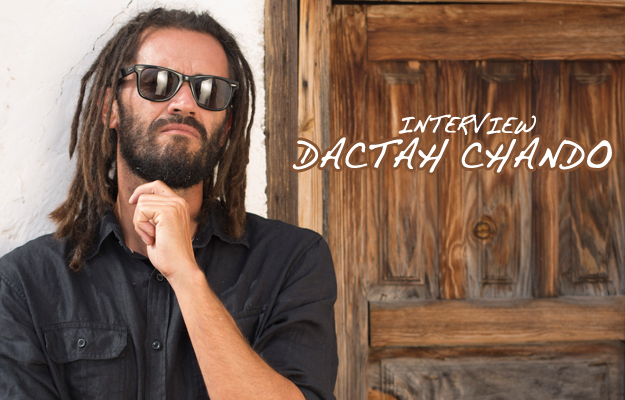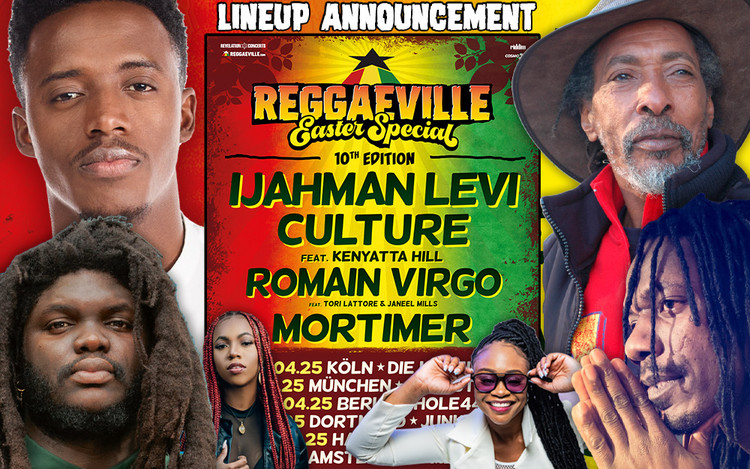Dactah Chando ADD
Interview with Dactah Chando
11/12/2013 by Valentin Zill

From the shores of the Spanish island of Tenerife, the singjay and passionate surfer Dactah Chando returns with his second or third album—choice is yours, he says—, called Sabiduria. While the preceding Clara received critical acclaim most notably in Spain and Germany, Sabiduria sounds as 2013 as a vocal-rich dub album can be and comes with the potential to internationalize Chando's career. REGGAEVILLE called Dactah Chando while he was on tour with Ilbilly Hitec through Germany.
What are your musical influences?
First of all, my influences were Latin music, because in the Canary Islands, we have a lot of Latin music and a lot of Latin culture. Cumbia, Merengue, Salsa, this kind of stuff. That was my first influence. Then I moved to rock music, and then I moved to reggae music. Now I'm here (laughs).
Are there artists which influenced you especially?
I'm in the reggae thing because of Peter Tosh, most of all. Because of Lucky Dube, because of Third World, because of Steel Pulse, and these great bands from the past. And because of Bob Marley, too. They were my first big sources.
At home in Tenerife, you start your days by going to the beach to surf. Music and surfing, do they get you into a similar flow?
Yeah, for me it's kind of the same thing. Because music is energy, and you are involved all the time in energy, because you are doing such beautiful things with music. When you surf, you surf energy in the sea, but it's the same energy in the end. I mean, the whole energy, no matter what it is, it's the same energy.
My colleague Adrian Nowak once called you the "Jack Johnson of reggae music".
Yeah (laughs). Some people like to put nice titles to the musicians. I appreciate that kind of title, you know, but I don't think I'm the Jack Johnson of Spanish reggae music. I try to do my best, but you know, it's funny to know that the people like to compare you with some great artists like him. For me, it's a funny thing.
Since Tenerife is quite a long way from mainland Spain, how connected are you with the reggae scene there?
Because of that distance, we are a little bit isolated. We don't really have too much contact with the mainland. We have the same contact with Europe instead and with Latin America, because we are separated by thousand kilometers of water from Spain. The contact isn't so close. I don't know why. Maybe it's a cultural thing. But nowadays, we are trying to get more and more in contact with the mainland. For us, it's like a kind of challenge. With the passing of time, more and more are we breaking this big barrier.
Sabiduria is your third album, right?
Yeah, but officially it's my second professional album. My first-first album was not such a professional thing, it was not released internationally. It was only released in Canary Islands. It could be my third, if you want.
So you don't have any intention to make Dactah Chando available outside of the Canary Islands?
Maybe in the future. We are thinking about remastering the tunes, maybe remakes of these tunes, and release it in Europe. By now, we are more concentrating on Sabiduria, and Clara, which are to me the best quality albums by now. We are now working with these two albums. How did you create the songs on Sabiduria? Do you have a melody before you write the lyrics?
How did you create the songs on Sabiduria? Do you have a melody before you write the lyrics?
Sometimes the lyrics come first, sometimes the music comes first. But most of the songs, I compose them in my home with my guitar first. Then I go to my home studio and play the instruments, like drums, bass, keyboards, and make the first idea of the song. And then, when the songs are already done, the first demos, I contact some producers to help me to do it well. Because I'm not such a good engineer and I don't have a very good studio to finalize the work process. I like to be helped by producers, because other people can do some precious ideas that I'm not able to do.
For your latest album, you worked with no less than four different producers.
Yeah, that was really nice. For me, it's quite good, because I love all four producers. Each one has his own different kind of understanding of music, and I love all the work that they've done.
Weren't you afraid of loosing the thread by working with so many producers on a single album?
No, because for me, in the end, music is music, and I love to taste different things. Because I love the difference in music. For me, one thing that is important in music is the diversity. To be different and to incorporate different styles and sounds, because to me, that is enrichment.
One of the producers on board is Guido Craveiro, who already worked with you on your last album Clara. How did you get in touch with him in the first place?
Because Guido Craveiro is a longtime friend of my manager and the owner of the Achinech label, Ingo, and they are very good friends. They were working together a long time ago with a band called... I forgot the name. They were working and creating music in the early era of the German reggae scene. They were friends. Because of that, the contact was so easy to establish for us.
There's another German producer on board, Umberto Echo.
For me it's a big thing to have Umberto on the album, because I love his kind of mixing style and his work. Now on this album, Sabiduria, we are gonna have one, only one remix from Umberto Echo. But we have plans to do a second release of the same album in the future, with all songs in roots versions. Now we have like a modern style, with Rob Smith. There's gonna be a new release, same songs, but in roots style, most of them mixed by Umberto Echo.
Of course you have Roberto Sanchez on board, who seems to be the number one Spanish reggae producer.
Yeah, really. I love and appreciate all that he's doing, because I'm an early reggae lover, and I love his kind of style, his early kind of reggae style. The thing that was really... I was planning to have a roots reggae album, so I first contacted Roberto Sanchez to make that album. And then, with the passing of time, we did all the stuff, we did all the songs, and we decided to remix it, just to give the songs a fresher sound, to be more on the avant-garde side. That's why, as I told you before, we're planning to release a roots album with the original productions of Roberto Sanchez. That was the way. First was Roberto, then we did the whole album, and then we said, hm, let's remix it, just to see how it fits. We were so happy with the remixes. We said, OK, first the remixes, and then the roots.
There's one producer you would have to tell me more about, Rob Smith from the UK.
Rob Smith is like the Daddy in this kind of job. Rob has been a well-known producer for a long time. He's one of the best producers of this kind of sounds in the world, underground sounds. For me he's the inventer of dubstep in the early 90s. So for me, having this master doing remixes is completely amazing. I never expected that Rob Smith could ever mix one of my songs.
Which musicians worked with you on Sabiduria?
For the first songs in roots style with Roberto Sanchez, which are the original songs, most of the songs were played by Roberto Sanchez and his closest friends there in Spain, some musicians from Catalonia and some musicians from his own crew. Then Umberto Echo did also in his mixes some fresh arrangements, like guitars and keyboards, and stuff like that. And then, Rob Smith in his mixes did programming, and new bass lines. And I played some guitars and some percussions, some small things, you know. And Guido Craveiro also. You know he's a music man. Since I don't speak Spanish unfortunately, what messages do you want to spread through the album?
Since I don't speak Spanish unfortunately, what messages do you want to spread through the album?
Sabiduria means wisdom, that's the topic of the album. I want to talk about wisdom in this time. For me, wisdom is the most important thing in life. Our lives could be better. And nowadays, I think we need more wisdom than ever, because of all the problems in life, since we are human beings. Maybe it could be a positive thing for a person to discover what is inside of his heart and inside of the mind. And to fill the heart with wisdom more than chasing money and material things. That is the main message of the album.
How would you define wisdom?
For me, wisdom is the knowledge of yourself, the knowledge of life. Nothing more.
You're currently on tour in Germany through November. Did you get used to the temperatures here already?
No (laughs). No. Not really. But you know, I'm here like for one month, and I will become more comfortable with that kind of cold. Till now, there is not so much cold. It's OK (laughs).
You're touring with Illbilly Hitec.
I'm so happy because they are giving me a nice chance to perform all over Europe and all over Germany. I'm so grateful to them, because they are so very nice people and so really nice workers. They got a nice sound. We are touring right now, till the 18th of November. It is a nice experience to play with them and to perform with such an audience that doesn't even know what I'm doing. They are supporting me quite, quite, quite well.









